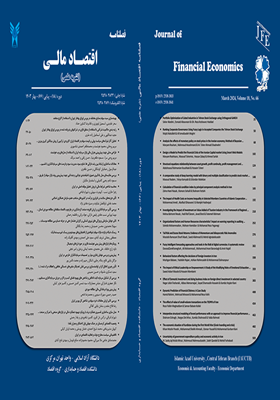تأثیر رهبری اخلاق گرا بر توانمندسازی: بررسی نقش تعدیلگر متغیرهای خستگی عاطفی و انعطاف درک شده (مورد مطالعه: نهاد ریاست جمهوری اسلامی ایران)
محورهای موضوعی : اقتصاد مالی
سعید عسکری ماسوله
1
,
حسین ممبینی
2
*
![]()
1 - گروه مدیریت مالی، واحد تهران مرکزی، دانشگاه آزاد اسلامی، تهران، ایران
2 - گروه مدیریت مالی، واحد تهران مرکزی، دانشگاه آزاد اسلامی، تهران، ایران
کلید واژه: M14, واژههای کلیدی: توانمندسازی, رهبری اخلاقگرا, خستگی عاطفی و انعطاف درک شده. طبقه بندی JEL : M12, D91,
چکیده مقاله :
چکیده این مطالعه به بررسی نقش رهبری اخلاق گرا در توانمندسازی کارکنان می پردازد. در سناریوی دنیای امروز، درک تأثیر انعطاف پذیری و خستگی عاطفی در ساخت مفهوم توانمندسازی امری ضروری است. بنابراین، مطالعه حاضر انعطاف پذیری درک شده و خستگی عاطفی را به عنوان تعدیل کننده های احتمالی میان رابطه رهبری اخلاق گرا و توانمندسازی کارکنان بررسی می نماید. این تحقیق از نوع توصیفی و پیمایشی است. برای گردآوری دادهها در سال 1400 و سنجش متغیرها به منظور بررسی مدل تحقیق، پرسشنامه ای 30 سؤالی طراحی و توزیع گردید. پایایی پرسشنامه با استفاده از روش آلفای کرونباخ برای هر قسمت بالاتر از 7/0 برآورد گردید و از طریق تحلیل روایی سازه، روایی پرسشنامه نیز مورد تأیید قرار گرفت. نویسندگان ضمن مرور کامل مبانی نظری، اعضای نمونة آماری را با روش نمونه گیری تصادفی از بین مدیران نهاد ریاست جمهوری در شهر تهران انتخاب نمودند. تحلیل عاملی تأییدی و تحلیل رگرسیون به کمک نرم افزار Smart PLS به منظور سنجش فرضیات و بررسی تمایز ساختارها در پژوهش انجام شد. یافته های تحقیق نشان داد که رهبری اخلاق گرا اثر معنی داری بر توانمندسازی روانشناختی و ساختاری دارد. همچنین تأثیر تعدیل گر متغیرهای انعطاف پذیری درک شده و خستگی عاطفی در رابطه رهبری اخلاق گرا و توانمندسازی معنی دار بود و فرضیات تحقیق همگی مورد تأیید قرار گرفتند. با توجه به ویژگی های خاص نهاد ریاست جمهوری و تأکید آنها بر اخلاق مداری به منظور رسیدن به کمال سازمانی، نتایج این پژوهش می تواند توسط سایر نهادهای دولتی نیز مورد استفاده قرار گیرد
Abstract This study examines the role of ethical leadership in employee empowerment. In today's world scenario, understanding the impact of flexibility and emotional Exhaustion is essential to building the concept of empowerment. therefore, the present study examines perceived flexibility and emotional Exhaustion as possible modifiers on the relationship between ethical leadership and employee empowerment. This research is a descriptive and survey type. a 30-item questionnaire was designed and distributed in 2021 to collect data and measure variables in order to evaluate the research model. The reliability of the questionnaire was estimated to be higher than 0.7 using Cronbach's alpha method for each part and the validity of the questionnaire was confirmed by structural validity analysis. The authors, while reviewing the theoretical foundations of the members of the statistical sample, selected them by random sampling method from among the managers of the presidential Administration of Iran in Tehran. Confirmatory factor analysis and regression analysis were performed using Smart PLS software to test the research hypotheses and examine the differences between the structures in the research. Findings showed that ethical leadership has a significant effect on psychological and structural empowerment. Also, the moderating effects of Emotional Exhaustion and Perceived Flexibility on the relationship between ethical leadership and empowerment was significant and the research hypotheses were all confirmed. Given the special characteristics of the Presidential Administration and their emphasis on ethics in order to achieve organizational perfection, the results of this study can be used by other governmental institutions.
فهرست منابع
وکیلی، یوسف. جعفری نیا، سعید. رفیعی، نسیم. (1397). تأثیر انعطاف پذیری منابع انسانی بر رفتار کاری نوآورانه: تبیین نقش میانجی سرمایه روان شناسی. مطالعات رفتار سازمانی. 7 (4) پیاپی (28): 31-52.
_||_

